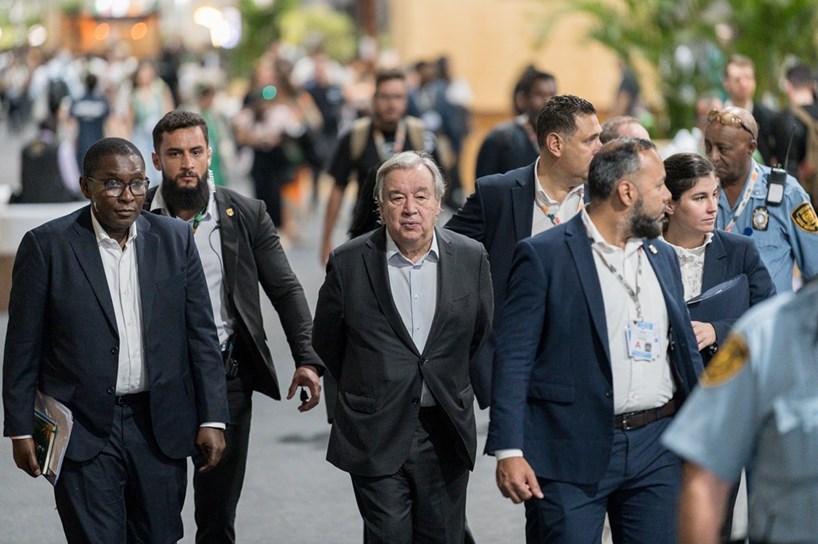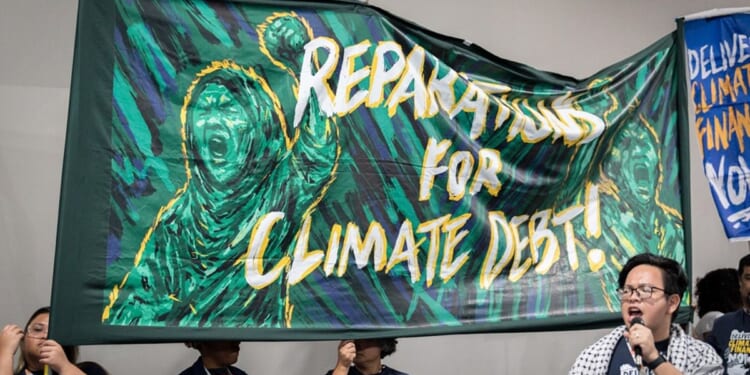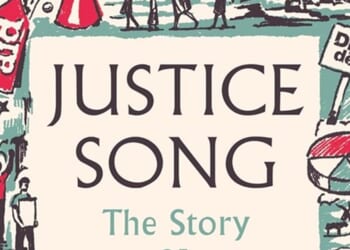EXTREME weather made its presence felt at the COP30 climate talks in Brazil on Monday. Peals of thunder, tropical rainfall, and then strong winds lashed the tented venue. Torrents of water flowed across walkways. Broadcasters from the Canadian national network sheltered under umbrellas inside their office.
It provided a fitting backdrop for Pope Leo, who was delivering a message by video link. “The creation is crying out in floods, droughts, storms, and relentless heat,” he said. “One in three people live in great vulnerability because of these climate changes. To them, climate change is not a distant threat, and to ignore these people is to deny our shared humanity.”
Strong climate policies, he said, were “an investment in a more just and stable world”, and he criticised governments that were failing to act quickly enough.
“The Paris Agreement has driven real progress, and remains our strongest tool for protecting people and the planet. But we must be honest: it is not the Agreement that is failing: we are failing in our response. What is failing is the political will of some. True leadership means service and support at a scale that will truly make a difference.”
His words were echoed by the UK’s Energy and Net Zero Secretary, Ed Miliband, who said that, though there were “climate deniers and delayers” around the world trying to stop progress, they were losing.
“They are losing because of economics. We are now seeing the world invest twice as much in clean energy as fossil fuels. They are losing because countries are acting: we see 80 per cent of the world’s GDP covered by Net Zero commitments, and, in the years since the Paris Agreement, we have seen forecast warming cut from 4ºC to around 2.3-2.5ºC.”
Mr Miliband was in a group of 18 ministers at a press conference on Tuesday, calling on the COP30 presidency and fellow nations to agree a roadmap for phasing out fossil fuels. Eighty-two countries back the plan, but there is opposition from some fossil-fuel producing countries, such as Saudi Arabia.
For the Primate of the Anglican Episcopal Church of Brazil, the Most Revd Marinez Bassotto, who lives in Belém, the host city of COP30, the summit has already had a positive effect in the host country. “Governments’ work is good and important, but we need to mobilise people for change,” she said. “That is what we are doing at this COP. The Church is with the people. We see what is happening.
“I see the effects of climate change all around me in the Amazon. More than that, I see that these effects have a colour and a gender. They impact women, Indigenous peoples, quilombolas [descendants of Afro-Brazilian slaves], and traditional peoples most.”
 Albin HillertThe UN Secretary-General, António Guterres, pictured on Wednesday at COP30
Albin HillertThe UN Secretary-General, António Guterres, pictured on Wednesday at COP30
One group that has experienced a disproportionate amount of climate suffering is Filipinos. In 2013, at COP19, in Warsaw, Yeb Sano, a young negotiator for the Philippines became the face of the climate talks when he spoke through tears the day after Typhoon Haiyan devastated his home town while he was at the summit (News, 29 November 2013).
A Roman Catholic, he now chairs the Laudato Si’ Movement. Another storm, Typhoon Fung-wong, struck his country on the eve of this year’s COP. A study by Imperial College, London’s “Climate Damage Tracker” has found that climate change made Typhoon Fung-wong 17 per cent more likely, and increased its damage in the Philippines by 42 per cent. In a future world warmed by 2°C, a Fung-wong-type typhoon would result in 63 per cent more damage, compared with a scenario without man-made climate change.
Mr Sano said that the study underlined the urgent need for more public climate finance from developed countries to help vulnerable nations to adapt and deal with the consequences of such extreme weather.
“For years, rich nations have asked for ‘proof’ that specific disasters are linked to climate emissions before discussing liability or compensation,” he said. “Today, the Climate Damage Tracker has laid that proof on the table.”
The world was no longer dealing with natural weather variability. “We are dealing with unnatural disasters, pumped up on fossil-fuel steroids,” he said. “When a study tells us that nearly half of the destruction from a typhoon is attributable to climate change, it changes the political reality of these negotiations.
“The 42-per-cent increase in damage from Typhoon Fung-wong represents homes that didn’t need to fall, livelihoods that didn’t need to be lost, and debt that developing nations shouldn’t have to bear alone.”
Elsewhere, 62 faith institutions announced their disinvestment from fossil fuels, including 42 members of the Arbeitskreis Kirchlicher Investoren, a network of institutional investors in the Evangelical Church in Germany.
The co-ordinator of Green Anglicans, the Revd Dr Rachel Mash, welcomed the news, and said that disinvestment was a significant action that faith communities could take. “In the face of so much bad news, we celebrate the commitment of 62 faith institutions to divest,” she said.
The Christian climate scientist Dr Katharine Hayhoe, Dr Mash said, “reminds us that the giant boulder of climate action isn’t sitting at the bottom of an impossibly steep hill with only a few hands trying to push it up, but, rather, it is already at the top, and rolling down the hill, with millions of hands pushing it in the right direction — that gives us hope. It isn’t going fast enough yet, but for each new hand that joins, it will go a little faster.”
The talks in Belém are scheduled to close on Friday.
Joe Ware is senior climate journalist at Christian Aid.

















